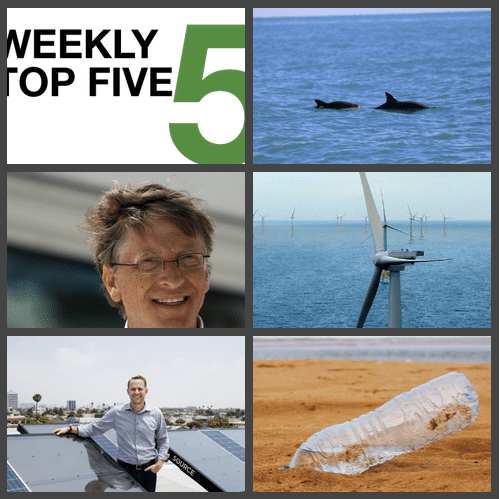Top 5 Happy Eco News – October 21-27, 2018
1) Bill Gates throws new weight and cash into climate fight
Bill Gates’ philanthropy seems to be taking a bit of a shift in focus. He recently announced two new initiatives directly related to climate change. The Global Commission on Adaptation will focus on managing the effects already linked to climate change and help the world adapt to the new reality. The Breakthrough Energy Europe initiative, creates an investment fund for technologies that will help reduce the impacts of increased human development and need for energy. The fund, valued at €100m will fund new companies developing clean energy and carbon capture technologies. As developing nations continue to raise their standard of living, they will require ever more energy. These two projects, combined with the Breakthrough Energy Coalition (a global group of 28 high net worth investors committed to funding clean energy companies) will help spur clean growth in key high emissions industrial sectors.
http://https://happyeconews.com/bill-gates-throws-new-weight-and-cash-into-climate-fight-2/
2) Scottish Power Becomes First Energy Giant to go 100% Green
Joining market leaders like Orsted (formerly DONG), Scottish Power this year divested of their traditional energy portfolio. Now the first vertically integrated UK energy firm to completely exit coal and gas generation, Scottish Power will pump £5.2 billion into clean technology companies and work exclusively with clean energy generation. Currently, Scottish Power has an impressive 2,900 MW In offshore wind in the UK and is currently constructing and additional 714 MW. The divestment of coal and gas makes it also the first energy giant worldwide to go 100% green.
3) Scientists Catch Rare Glimpses of the Endangered Vaquita
Several pairs of critically endangered Vaquita dolphins and their offspring have been sighted last month in their home waters of the Sea of Cortez in Northern Baja California. Once plentiful in the area, Vaquita populations have been decimated as the mammals were drown in illegal nets set for the also endangered Totoba – a fish highly prized for traditional medicine in China. Reduced to an estimated 30 animals worldwide, the Vaquita is a social animal and is able to reproduce every year making it a prime candidate to recover. The species has received protection from the illegal fishing nets from the Mexican federal government and the most recent sightings give great hope for the future.
4) The EU just voted to completely ban single-use plastics
The European Union recently voted in favour to completely ban single use plastics. Comprising 49% of the waste found on EU beaches, the ban covers all items where other, non-plastic and biodegradable alternatives exist. Items that do not have plastic free alternatives must be reduced by 25% by 2025. Other items not usually covered by this type of legislation will be affected such as cigarette filters which will have to reduce their plastic by 50% by 2025 and 80% by 2030. Further, by 2025 90% of plastic beverage bottles (which account for 20% of all ocean plastic) must be collected for recycling.
5) These solar panels can pull clean drinking water out of the air — and they’ve spread to 12 countries around the world
A startup called Zero Mass Water aims to make clean water easily accessible to more people around the world. In 2015, it launched its first product, Source — a solar panel array that harvests and filters water from vapor in the air. Now in 11 countries around the world, Source provides fresh, clean water for people in remote communities or even in cities if requested. In one case, the government in Arizona, USA installed one system in the desert to provide a year-round source drinking water for wild animals where there had been none before.








